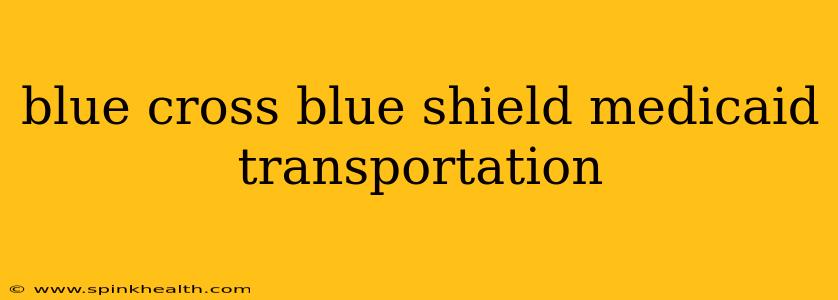Getting the healthcare you need shouldn't be hampered by transportation challenges. This is especially true for those relying on Medicaid coverage through Blue Cross Blue Shield (BCBS). Many find navigating the complexities of BCBS Medicaid transportation confusing, so let's break it down. This isn't just about getting from point A to point B; it's about ensuring access to vital medical care. My name is Sarah, and I've spent years helping individuals understand their healthcare options. Let's explore this together.
What Transportation Assistance Does BCBS Medicaid Offer?
The specifics of transportation assistance through BCBS Medicaid vary significantly depending on your state. There isn't a single, nationwide program. Your eligibility and the types of transportation covered depend entirely on your state's Medicaid program and any supplemental programs they offer in conjunction with BCBS. Some states might partner with ride-sharing services, while others have contracts with specific transportation providers. This means the first step is always contacting your state's Medicaid office or your BCBS representative. They can provide precise details about your coverage area and available options.
Does Blue Cross Blue Shield Medicaid Cover Non-Emergency Medical Transportation (NEMT)?
This is a frequently asked question, and the answer is: it depends. Many BCBS Medicaid plans do offer NEMT coverage, but the extent of this coverage varies drastically by state. NEMT typically covers transportation to and from doctor appointments, dialysis, and other essential medical services that aren't emergencies. However, some states may have limitations on the number of trips covered per month or the distance they will cover. Always check your plan details carefully, or even better – confirm with your BCBS representative or the state Medicaid office. They have the most up-to-date information about your specific coverage.
How Do I Apply for BCBS Medicaid Transportation Assistance?
The application process also varies depending on your state. Some states may have a streamlined online application, while others might require you to submit a paper application. You’ll typically need to provide documentation proving your eligibility for Medicaid and details about your medical appointments. This often includes your provider's information and the dates and times of your appointments. The best approach? Contact your state's Medicaid agency or your BCBS case manager. They can guide you through the specific steps and necessary paperwork for your area.
What Documents Do I Need to Apply for Transportation Assistance?
Required documents can change according to your location and specific circumstances. However, you'll generally need proof of your Medicaid eligibility, details of your medical appointments (dates, times, and provider information), and possibly a doctor's referral or prescription. It's best to contact your state’s Medicaid office or your BCBS representative directly. They'll provide a precise list of necessary documents for your specific situation. Being prepared with the correct documentation will make the process smoother.
What if I Need Transportation for a Medical Emergency?
In a medical emergency, dial 911 immediately. NEMT programs, even through BCBS Medicaid, are not designed for emergencies. Emergency Medical Services (EMS) will transport you to the nearest appropriate medical facility. Focus on your immediate health needs in an emergency, and worry about transportation logistics afterward.
Can I Use Ridesharing Services Like Uber or Lyft with My BCBS Medicaid Plan?
While some states might have partnerships with ride-sharing services, it's generally not recommended to assume your BCBS Medicaid plan will cover costs from Uber or Lyft. Many NEMT programs only work with pre-approved transportation providers. Using a ride-sharing service without prior approval could lead to out-of-pocket costs. Always clarify coverage directly with your plan provider or state Medicaid agency before using any third-party transportation service.
What Happens if My Request for Transportation is Denied?
If your request for transportation assistance is denied, don't give up! Find out the reason for denial – this is a crucial step. The denial letter (or explanation from your case manager) will often outline the reason. You can then appeal the decision. Usually, there's a specific appeals process outlined within your state's Medicaid guidelines or in your BCBS plan information. Following this appeals process carefully is key to potentially overturning the denial.
This guide offers a general overview; it's vital to remember that the specifics of your BCBS Medicaid transportation coverage are unique to your state and your plan. Direct communication with your state's Medicaid office and your BCBS representative is the most reliable way to obtain accurate and tailored information. Remember, your access to healthcare shouldn't be limited by transportation difficulties. Take proactive steps to understand your options and advocate for yourself.

